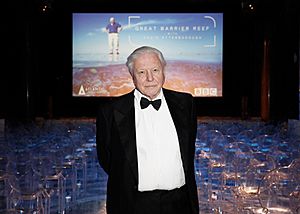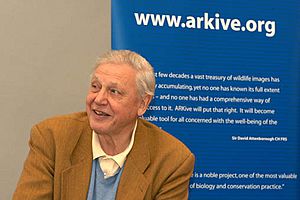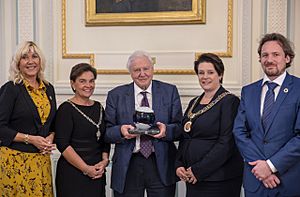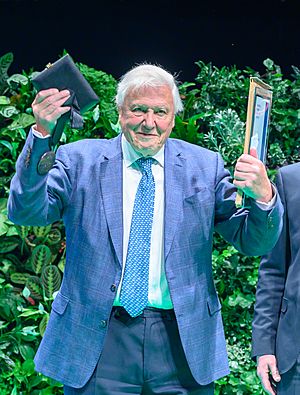David Attenborough facts for kids
Quick facts for kids
David Attenborough
|
|
|---|---|
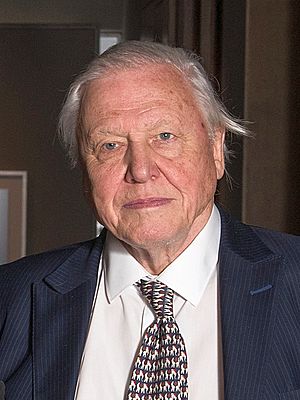
Attenborough in 2015
|
|
| Born |
David Frederick Attenborough
8 May 1926 Isleworth, Middlesex, England
|
| Education | |
| Occupation |
|
| Years active | 1951–present |
| Title |
|
| Spouse(s) |
Jane Ebsworth Oriel
(m. 1950; died 1997) |
| Children | 2 |
| Parent(s) |
|
| Relatives |
|
| Awards |
|
| Signature | |
Sir David Frederick Attenborough (born 8 May 1926) is a famous British broadcaster, biologist, and writer. He is known for his amazing nature documentaries. A natural historian studies nature, including animals, plants, and how they live.
David Attenborough first became famous in 1954 with his show Zoo Quest. Since then, he has written, presented, and narrated many nature series. These include The Life Collection, Planet Earth, and The Blue Planet. He is the only person to have won BAFTA Awards for shows made in black-and-white, colour, high-definition, 3D, and 4K. He has also won many other awards, including three Emmy Awards for his narration.
Attenborough also worked as a senior manager at the BBC. He was in charge of BBC Two and later became the director of programming for BBC Television in the 1960s and 1970s. While his early work focused on the wonders of nature, his later work has strongly supported protecting the environment. He has spoken about saving biodiversity, controlling population growth, using renewable energy, and fighting climate change. Many people in the UK consider him a national treasure.
Contents
Early Life and Family
David Frederick Attenborough was born on 8 May 1926 in Isleworth, Middlesex, England. He grew up in College House at the University of Leicester. His father, Frederick Attenborough, was the principal of the university. David was the middle of three sons. His older brother, Richard Attenborough, became a famous actor and director. His younger brother, John Attenborough, worked for a car company. During World War II, his parents also welcomed two Jewish refugee girls from Germany into their home.
David loved collecting fossils, stones, and natural items as a child. When he was about 11, he heard that the university's zoology department needed newts. He offered to supply them for a small fee. He got the newts from a pond right next to the department, but he kept that a secret at the time! A year later, his adoptive sister gave him a piece of amber with ancient creatures inside. Sixty years later, this amber became the focus of an episode in his series Natural World.
In 1936, David and his brother Richard heard a lecture by Grey Owl, a conservationist. Grey Owl's message about protecting nature deeply influenced David. He learned that humans were harming nature by destroying its resources. This idea stayed with David throughout his life.
David went to Wyggeston Grammar School for Boys in Leicester. In 1945, he won a scholarship to Clare College, Cambridge, where he studied geology and zoology. After college, he served two years in the Royal Navy.
Career in Television
Starting at the BBC
After leaving the navy, David Attenborough worked editing science textbooks for children. He didn't enjoy it much. In 1950, he applied for a job at the BBC radio, but he didn't get it. However, his application caught the eye of Mary Adams, who led the factual broadcasting department for the BBC's new television service. At that time, David didn't even own a television and had only seen one show in his life!
He accepted a three-month training course and joined the BBC full-time in 1952. At first, he wasn't allowed to appear on camera because Mary Adams thought his teeth were too big! He became a producer for non-fiction shows. His early projects included a quiz show called Animal, Vegetable, Mineral?
Attenborough's journey into natural history shows began when he produced Animal Patterns. This show featured animals from London Zoo. Through this, he met Jack Lester, who worked at the zoo. They decided to make a series about an animal-collecting trip. This led to Zoo Quest, which first aired in 1954. David became the presenter at the last minute because Jack Lester became ill.
In 1957, the BBC Natural History Unit was created in Bristol. David was asked to join but preferred to stay in London with his family. Instead, he started his own department, the Travel and Exploration Unit. This allowed him to keep presenting Zoo Quest and make other documentaries. In the early 1960s, he left the BBC for a short time to study social anthropology. But he soon returned to the BBC to become the controller of BBC Two.
Leading BBC Two
David Attenborough became the Controller of BBC Two in March 1965. He made sure his contract allowed him to keep making programmes sometimes. For example, he filmed elephants in Tanzania in 1965 and made a series about Bali in 1969. In 1971, for the film A Blank on the Map, he joined an expedition to New Guinea to find a lost tribe.
BBC Two had started in 1964 but wasn't very popular. When Attenborough took over, he changed the schedule to make the channel unique. He wanted BBC Two to offer a wide variety of shows, different from other channels. Under his leadership, the channel featured music, arts, comedy, travel, science, and natural history. He commissioned popular shows like Monty Python's Flying Circus. When colour television arrived, Attenborough brought snooker to the BBC to show off the new colours. This show, Pot Black, helped snooker become very popular.
One of his most important decisions was to order a 13-part series on the history of Western art, called Civilisation. This show, presented by Sir Kenneth Clark, was a huge success. It became a model for other big documentaries. Attenborough thought that the story of evolution would be a great subject for such a series. He shared his idea, and the title Life on Earth was suggested. David really wanted to present this series himself, but he couldn't while he was in a management job.
In 1969, Attenborough was promoted to director of programmes, overseeing both BBC channels. This job involved a lot of meetings and budgets, far from filming. When he was considered for the top job at the BBC in 1972, he decided he didn't want it. In 1973, he left his management role to go back to making programmes full-time. This allowed him to work on his big natural history series.
After leaving his management role, Attenborough became a freelance broadcaster. He started a trip to Indonesia, which resulted in the 1973 series Eastwards with Attenborough. This show was similar to Zoo Quest but in colour. He also presented a series on tribal art and another on voyages of discovery. He even presented a children's series about mythical creatures called Fabulous Animals.
The Life Series
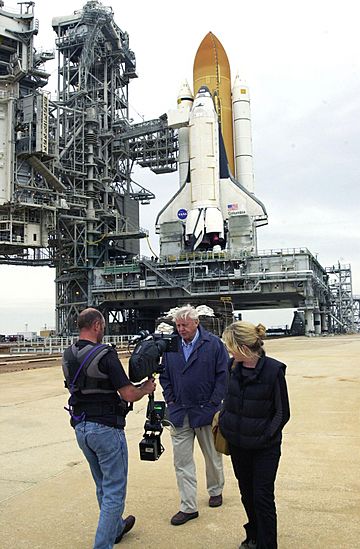
Starting with Life on Earth in 1979, David Attenborough created a collection of shows that set a new standard for wildlife filmmaking. These series became a guide for many documentary filmmakers. Life on Earth showed many new things about how the BBC made nature shows. Attenborough and his team worked closely with scientists, who trusted them to feature their research.
They also used new filmmaking techniques to capture never-before-seen moments. The series allowed Attenborough to travel to many different places around the world in each episode. Even though he was the presenter, he kept his on-screen time short to focus more on the animals and their stories.
Five years after Life on Earth, the BBC released The Living Planet. This series explored how living things adapt to their environments. It was another big success. In 1990, The Trials of Life completed the first "Life" trilogy, looking at how animals behave during different stages of their lives.
In the 1990s, Attenborough continued to make "Life" series. In 1993, he presented Life in the Freezer, the first TV series about the natural history of Antarctica. Even though he was past normal retirement age, he then focused on more specific parts of the natural world, starting with plants. It was hard to make plants interesting for TV, but The Private Life of Plants (1995) used time-lapse photography to show plants growing and moving, making them seem dynamic.
Next, Attenborough turned his attention to birds. Since he wasn't a bird expert, he decided to focus on their behaviour in The Life of Birds (1998). This series won an award. The order of his later "Life" series depended on new camera technology. For The Life of Mammals (2002), special cameras were used to show the behaviour of animals at night. In 2005, Life in the Undergrowth introduced viewers to the world of tiny creatures like invertebrates.
By 2008, with Life in Cold Blood (about reptiles and amphibians), Attenborough had completed a huge collection of programmes covering all the major groups of land animals and plants. He said, "The evolutionary history is finished. The effort is complete." However, in 2010, he added First Life, which explored the earliest forms of life before Life on Earth, saying it truly completed the set.
More Nature Documentaries
Alongside the "Life" series, Attenborough kept working on other nature documentaries. He narrated every episode of Wildlife on One, a popular BBC One series that ran for many years. He also narrated over 50 episodes of Natural World.
In the new millennium, Attenborough continued to work with the BBC Natural History Unit. He narrated The Blue Planet (2001), a big series about marine life. He also narrated Planet Earth (2006), which was the largest nature documentary ever made for television and the first BBC wildlife series filmed in high definition.
In 2009, Attenborough co-wrote and narrated Life, a series about amazing animal behaviour. He also narrated Nature's Great Events, which showed how seasonal changes cause big natural events. In 2011, he had a bigger role in Frozen Planet, a series about the polar regions. He appeared on screen and wrote the final episode. He also narrated Planet Earth II (2016) and Blue Planet II (2017). Blue Planet II was very popular and helped raise awareness about plastic pollution.
In 2018, he narrated Dynasties, a five-part series focusing on one species per episode. In 2021, he presented Attenborough's Life in Colour and The Mating Game. Attenborough also returned to prehistoric life with Dinosaurs: The Final Day and Prehistoric Planet in 2022.
Protecting Our Planet
Environmental Advocacy
As the year 2000 approached, Attenborough's documentaries started to focus more on environmental issues. In State of the Planet (2000), he used scientific evidence to show how human activities affect the natural world. He later explored global warming in The Truth about Climate Change (2006) and human population growth in How Many People Can Live on Planet Earth? (2009).
In 2019, Attenborough narrated Our Planet for Netflix. This series strongly highlighted the damaging role of human activities. He also narrated Wild Karnataka, a documentary about the Karnataka forest in India. In the same year, his BBC One film Climate Change – The Facts aired, which had a very serious tone about the climate crisis. This was followed by Extinction: The Facts, which discussed the ongoing decline of biodiversity.
In 2020, Attenborough narrated the film David Attenborough: A Life on Our Planet. This film is like his personal statement, looking back at his career and sharing his hopes for the future. It was released on Netflix. He also narrated Breaking Boundaries: The Science of Our Planet in 2021. In October 2020, Attenborough began filming The Green Planet, and in 2021, he narrated A Perfect Planet.
Attenborough was a key figure leading up to the 2021 United Nations Climate Change Conference (COP26). He gave a speech at the opening ceremony, saying that humans are "the greatest problem solvers" and expressing hope for a "wonderful recovery" in the future. In 2022, the United Nations Environment Programme honored Attenborough as a Champion of the Earth for his dedication to protecting and restoring nature.
Views on the Environment
Attenborough's programmes have often shown how humans impact the environment. For example, the last episode of The Living Planet focused on human destruction of the environment and how to stop it. While some people felt he didn't always emphasize environmental messages enough, his recent films like Extinction: The Facts and Climate Change – The Facts have been praised for their urgent messages. In Seven Worlds, One Planet, he discusses the terrible impact of deforestation.
Attenborough has supported many conservation efforts. He backed a project to stop the killing of albatross by fishing boats. He also supported WWF's campaign to protect a large area of Borneo's rainforest. He is a vice-president of several conservation groups, including Fauna and Flora International and Butterfly Conservation.
In 2003, Attenborough helped launch ARKive, a project to create a digital library of natural history media. He also became a patron of the World Land Trust. In 2020, he supported a campaign to stop deep sea mining because of its harm to marine life. During the COVID-19 pandemic, he spoke out to help the Zoological Society of London (ZSL) with their conservation work. He is also a member of the Earthshot Prize Council, which aims to find solutions to environmental problems.
Attenborough was initially unsure about human influence on climate change. He said a lecture in 2004 finally convinced him that humans were responsible. He then started speaking out about it in 2006. He attended COP26 as the "People's Advocate" and urged world leaders to reduce emissions. In his 2020 documentary David Attenborough: A Life On Our Planet, Attenborough suggests that people eat less meat or become vegetarian to help save wildlife.
Views on Human Population
Attenborough believes that the growing human population affects the environment. He is a patron of Population Matters, a charity that supports family planning and sustainable living. In a 2013 interview, he said that humans are like a "plague on the Earth" and that sending food to famine-stricken countries without addressing population growth was "barmy." He called for more discussion about human population growth, noting that the human population had tripled since he started making programmes 60 years ago.
He believes that improving women's rights around the world can help limit birth rates. He has said that "anyone who thinks that you can have infinite growth in a finite environment is either a madman or an economist."
Views on Evolution and Creationism
Attenborough considers himself an agnostic, meaning he doesn't know if a God exists. When asked if observing nature has given him faith in a creator, he often tells a story about a parasitic worm that causes blindness in children in West Africa. He asks if an all-merciful God would create such a worm.
He believes that the evidence on Earth clearly shows evolution is the best way to explain the diversity of life. He says that if there is a supreme being, that being chose evolution to create the natural world. He has stated that he never really thought about believing in God.
In 2002, Attenborough joined scientists and religious leaders to oppose teaching creationism in UK schools alongside evolution. In 2009, he said that the Book of Genesis, which suggests humans control the world, has led generations to "dominate" the environment, causing much destruction. He believes that Darwinism and the fact of evolution are very important because they challenge this idea.
In 2009, the BBC aired his special, Charles Darwin and the Tree of Life. Attenborough stated that evolution is not just a theory, but a "solid historical fact." He said that evidence from all over shows that dinosaurs led to birds and mammals produced whales. He strongly opposes creationism and "intelligent design" being taught in science classes. He has joined other scientists in calling for creationism to be banned from the school science curriculum.
Views on the BBC
Attenborough has always supported the BBC and public service broadcasting. He believes that public service broadcasting is important for the UK and that it should measure its success not just by how many people watch, but by the variety of its shows.
He has said that the BBC offers great quality for a low cost. He believes that the television licence fee, which funds the BBC, is a great bargain. He has expressed concern that some people want to weaken the BBC by taking away the licence fee. He thinks that if the licence fee is destroyed, broadcasting could become a "wasteland."
Personal Life
In 1950, David Attenborough married Jane Elizabeth Ebsworth Oriel. They had two children, Robert and Susan. Jane passed away in 1997. Robert became a senior lecturer in bioanthropology at the Australian National University. Susan was a primary school headmistress.
Attenborough had a pacemaker fitted in 2013 and a double knee replacement in 2015. In 2013, he commented that he was lucky to be "swanning round the world looking at the most fabulously interesting things" for his job.
Achievements and Recognition
David Attenborough's work in broadcasting and wildlife filmmaking has earned him international fame. He is often called "the great communicator" and "the greatest broadcaster of our time." His programmes are seen as examples of excellent public service broadcasting and have inspired many wildlife filmmakers.
Honorary Titles
By 2013, Attenborough had received 32 honorary degrees from British universities, more than anyone else. He has honorary degrees from universities like Open University, Durham University, University of Cambridge, and the University of Oxford. In 2006, he and his brother Richard were honored by the University of Leicester, where their father was principal. He has also been made an honorary citizen of Leicester and Bristol.
He is an Honorary Fellow of many important societies, including the Zoological Society of London and the Linnean Society.
Recognition and Awards
Attenborough has been the subject of several BBC television programmes, including Life on Air (2002), which looked at his work. In 2006, British viewers voted for their Favourite Attenborough Moments, with the winning clip showing him observing the amazing mimicry skills of the superb lyrebird.
In 2006, he was named the most trusted celebrity in the UK. In 2007, he won The Culture Show's Living Icon Award. He was also named among the 100 Greatest Britons in a 2002 BBC poll. In September 2009, the Natural History Museum, London, opened the Attenborough Studio in his honour.
In 2012, Attenborough was chosen by artist Sir Peter Blake to appear in a new version of his famous Sgt. Pepper's Lonely Hearts Club Band album cover, celebrating British cultural figures. The same year, he was featured in the BBC Radio 4 series The New Elizabethans for his significant impact during the reign of Queen Elizabeth II.
A British polar research ship was named RRS Sir David Attenborough in his honour. While a public poll suggested the name Boaty McBoatface, the official name was chosen from other popular options. However, one of the ship's research sub-sea vehicles was named "Boaty" to acknowledge the public vote.
Attenborough also holds a Guinness World Records title for having the longest career as a natural historian and presenter in television.
Species Named After Attenborough
Many species and groups of animals and plants, both living and extinct, have been named in Attenborough's honour. These include:
- A type of hawkweed (Hieracium attenboroughianum)
- An Ecuadorian flowering tree (Blakea attenboroughi)
- One of the world's largest carnivorous plants (Nepenthes attenboroughii)
- A genus of flowering plants (Sirdavidia)
Several insects and other small creatures are named after him:
- A butterfly (Euptychia attenboroughi)
- A dragonfly (Acisoma attenboroughi)
- A tiny spider (Prethopalpus attenboroughi)
- A Caribbean spider (Spintharus davidattenboroughi)
- An Indonesian weevil (Trigonopterus attenboroughi)
- A Madagascan ghost shrimp (Ctenocheloides attenboroughi)
- A soil snail (Palaina attenboroughi)
- A fish parasite (Cichlidogyrus attenboroughi)
- A fossil grasshopper (Electrotettix attenboroughi)
- A small crustacean (Cascolus ravitis)
- A Caribbean bat (Myotis attenboroughi)
- A scarab beetle (Sylvicanthon attenboroughi)
- A brightly coloured fish (Nothobranchius attenboroughi)
- An extinct horseshoe crab (Attenborolimulus superspinosus)
Vertebrates named after Attenborough include:
- A Namibian lizard (Platysaurus attenboroughi)
- A bird (Polioptila attenboroughi)
- A Peruvian frog (Pristimantis attenboroughi)
- A Madagascan frog (Stumpffia davidattenboroughi)
- A type of echidna (Zaglossus attenboroughi)
- A fan-throated lizard from India (Sitana attenboroughii)
In 1993, a Mesozoic reptile was renamed Attenborosaurus conybeari. A fossilised armoured fish discovered in Australia in 2008 was named Materpiscis attenboroughi. This fossil is believed to be the earliest organism capable of internal fertilisation. In 2016, a miniature marsupial lion was named Microleo attenboroughi. In 2022, a 560-million-year-old creature, believed to be the first animal predator, was named Auroralumina attenboroughii.
Awards
David Attenborough has received many awards for his work:
- 1974: Appointed Commander of the Order of the British Empire (CBE)
- 1980: BAFTA Fellowship
- 1981: Kalinga Prize for popularizing science
- 1983: Elected a Fellow of the Royal Society
- 1985: Knighted, becoming Sir David Attenborough
- 1996: Member of the Order of the Companions of Honour (CH)
- 2005: Member of the Order of Merit (OM)
- 2009: Prince of Asturias Award
- 2015: Individual Peabody Award
- 2018: Primetime Emmy Award for Outstanding Narrator (won again in 2019)
- 2019: Crystal Award at the World Economic Forum
- 2019: Indira Gandhi Prize
- 2020: Knight Grand Cross of the Order of St Michael and St George (GCMG)
- 2021: Lifetime Achievement Award (Champions of the Earth)
- 2022: Champion of the Earth award from the United Nations Environment Programme
- 2022: Lifetime Achievement Award at the 43rd News and Documentary Emmy Awards
As of 2014, he was the only person to have won BAFTA Awards for programmes in black and white, colour, high-definition, and 3D.
Filmography
David Attenborough's television work spans over 70 years. His connection to natural history programmes began with The Pattern of Animals and Zoo Quest in the 1950s. His most important work, Life on Earth (1979), started a series of nine documentaries with the BBC Natural History Unit that shared the "Life" name and lasted for 30 years. He narrated the long-running BBC series Wildlife on One. In his later career, he narrated many famous BBC wildlife documentaries, including The Blue Planet and Planet Earth. He also helped pioneer 3D documentaries with Flying Monsters in 2010.
Images for kids
See also
 In Spanish: David Attenborough para niños
In Spanish: David Attenborough para niños
 | Chris Smalls |
 | Fred Hampton |
 | Ralph Abernathy |


